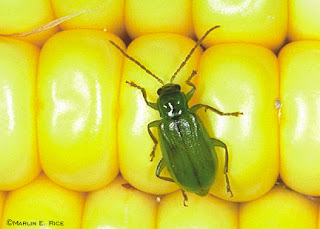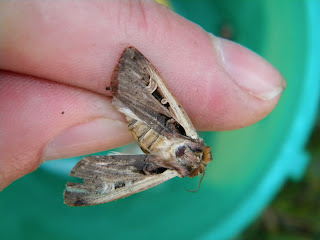Recently some clients have been asking about insect levels going into the spring and summer. The warm winter has been friendly to overwintering insects, so the natural question is "has this been beneficial to crop pests?" Ok, I will bite.
Corn Rootworm
Based on the very low numbers of adult rootworm last summer, I believe rootworm larvae have no chance of being a serious threat this year. Many hybrids have rootworm resistance technology.
Corn Borer
Western Bean Cutworm
Overwintering has been confirmed in tougher winters. Moth flights coming over the border will guarantee populations to increase. We have noticed this increase in our traps for two years. Bio-tech will help, but if you are unlucky enough to have a western bean frosh party in your field, you may have to spray. Scouting is important.
Black Cutworm
The black cutworm moth catches the red eye flight from the US and arrives in May. It is the beaver of the insect world because the larvae cut off young healthy corn plants at the base of the stalk. Adults look for grassy or weedy areas of the field to lay eggs. Traditionally, farmers along the north shore of Lake Erie have seen this one before. Some species prefer sandy soils. Not surprised if we see it further north, but won't be bad enough to warrant replant.
Bean Leaf Beetle
This one does appreciate the tropical winter. The adults hang out under trash and litter in protected areas. Cruiser treated soybeans give provide protection against the first generation. Second generation adults will feed on the pods, transmitting bean pod mottle virus, which can affect IP premiums and seed quality.
Soybean Aphid
Unpredictable does not begin to descibe soybean aphids. They overwinter on buckthorn and can explode at any time during the summer. Cruiser seed treatment really helps for the first 60 days after planting. July and early August are open season. Predators and disease cause aphid populations to crash and burn almost as fast as they build. Aphids do more to keep crop scouts employed than any other bug.
One thing to keep in mind is, while the winter helps some pests to suvive and prosper, it also helps diseases and predators. It is a dynamic relationship. Using insecticide only when necessary keeps the relationship in balance.
Now, about Randy Carlyle....






No comments:
Post a Comment